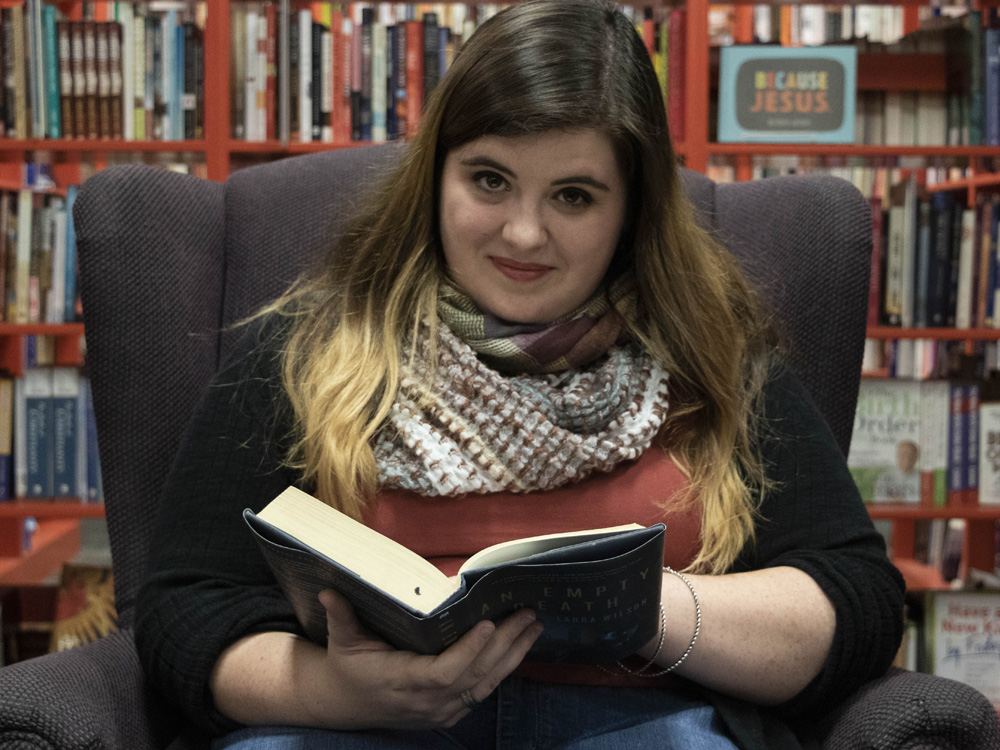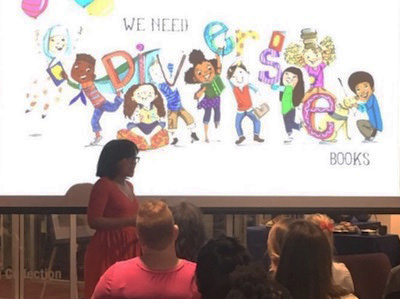Christy Duprey is a graphic artist, and a staff writer and podcast producer for Pine Reads Review, an online publication for young adult literature showcasing new and established writers. She has also interned with Sonora Review and volunteered at the Champlain College Young Writers’ Conference. Currently a senior at the University of Arizona, Duprey created the podcast Pine Reads Pod Reviews, which invites their interns, and guest hosts, to review the best and latest young adult literature.
 On September 27, author Dhonielle Clayton—cofounder of Cake Literary, a literary development company, and the chief operating officer of the nonprofit We Need Diverse Books—made quite the splash in the Sonoran Desert of Tucson, Arizona. Clayton, whose novel The Belles (Freeform, 2018) was recently recommended for the 2019 CILIP Carnegie Medal, came to Tucson at the invitation of Pine Reads Review and with the support of a grant from Poets & Writers’ Reading & Workshops program. She was able to organize two events at the University of Arizona, highlighting her accomplishments both as an author and an advocate for increasing diversity in children’s and young adult literature.
On September 27, author Dhonielle Clayton—cofounder of Cake Literary, a literary development company, and the chief operating officer of the nonprofit We Need Diverse Books—made quite the splash in the Sonoran Desert of Tucson, Arizona. Clayton, whose novel The Belles (Freeform, 2018) was recently recommended for the 2019 CILIP Carnegie Medal, came to Tucson at the invitation of Pine Reads Review and with the support of a grant from Poets & Writers’ Reading & Workshops program. She was able to organize two events at the University of Arizona, highlighting her accomplishments both as an author and an advocate for increasing diversity in children’s and young adult literature.
The evening event featured Clayton speaking about her journey into the literary world, focusing in particular on her mission to tell underrepresented stories. After an introduction from Pine Reads Review’s director Stephanie Pearmain, Clayton began by saying, “you can’t be what you can’t see,” pointing out that too few kids and teens see their own lives on the page. Not just lives centered around systemic struggles of race, sexuality, or disability, but lives that are about having fun. There are a great many stories out there of Black children facing down the horrors of slavery or civil rights abuses, she reminded the audience, but shockingly few about Black children discovering a magical land or going on a secret quest. When asked why her writing and the work published by her book developing company tend to skew more towards delightful adventure than inherited cultural pain, her answer was simple: “I want to create books that are just about kids doing fun stuff, and not dealing with drama.”
 The evening talk attracted members of the community ranging from teenage fans to teachers and librarians, as well as local writers hoping for insight into the publishing industry.
The evening talk attracted members of the community ranging from teenage fans to teachers and librarians, as well as local writers hoping for insight into the publishing industry.
In addition, Clayton held a workshop earlier in the day with the university’s publishing class to offer wisdom on the ins and outs of “the business” to juniors and seniors. In an environment where students are frequently pushed to—and often beyond—their breaking points, her advice was refreshing. She advocated for slowing down, for taking the time you need to get the writing right and take care of yourself. A round of chuckles followed her pronouncement: “There are days where you just have to be disgusting and watch Netflix, and then the next day you’re back to the grind.” It was a breath of fresh air to a room full of young writers hoping to enter an industry where burnout is common and stress levels are often high.
Clayton’s visit served as a reminder to aspiring writers that even when books are the focus, it’s the people who matter. She offered a vision of publishing that lifts others up. “As writers,” she said, “we have been given the great privilege to create something that gives people a space to explore who they are.”
Support for Readings & Workshops in Tucson is provided by an endowment established with generous contributions from the Poets & Writers Board of Directors and others. Additional support comes from the Friends of Poets & Writers.
Photos: (top) Christy Duprey (Credit: Victoria Pereira). (bottom) Dhonielle Clayton at the University of Arizona (Credit: Stephanie Pearmain).




 On September 27, author
On September 27, author  The evening talk attracted members of the community ranging from teenage fans to teachers and librarians, as well as local writers hoping for insight into the publishing industry.
The evening talk attracted members of the community ranging from teenage fans to teachers and librarians, as well as local writers hoping for insight into the publishing industry.